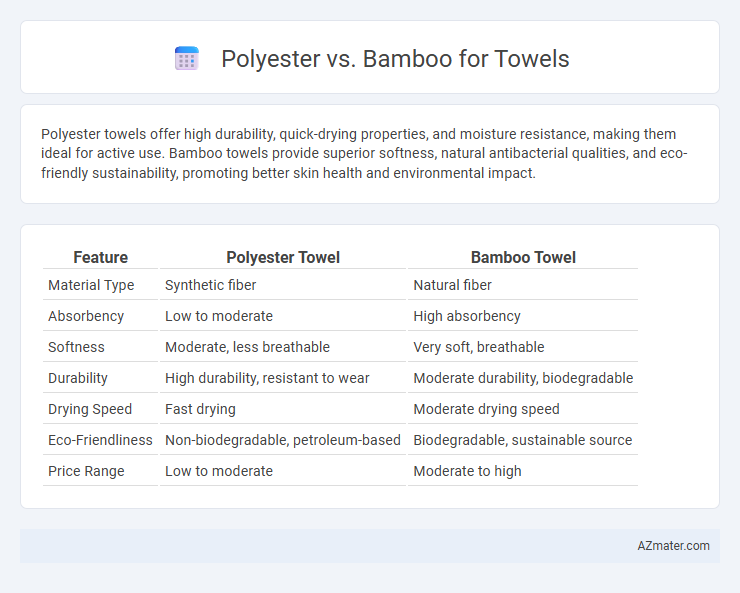Polyester towels offer high durability, quick-drying properties, and moisture resistance, making them ideal for active use. Bamboo towels provide superior softness, natural antibacterial qualities, and eco-friendly sustainability, promoting better skin health and environmental impact.
Table of Comparison
| Feature | Polyester Towel | Bamboo Towel |
|---|---|---|
| Material Type | Synthetic fiber | Natural fiber |
| Absorbency | Low to moderate | High absorbency |
| Softness | Moderate, less breathable | Very soft, breathable |
| Durability | High durability, resistant to wear | Moderate durability, biodegradable |
| Drying Speed | Fast drying | Moderate drying speed |
| Eco-Friendliness | Non-biodegradable, petroleum-based | Biodegradable, sustainable source |
| Price Range | Low to moderate | Moderate to high |
Polyester vs Bamboo Towels: An Overview
Polyester towels are known for their durability, quick-drying properties, and resistance to shrinking and mildew, making them ideal for frequent use and travel. Bamboo towels, made from bamboo fibers, offer superior softness, natural antibacterial properties, and excellent absorbency, providing a more eco-friendly and hypoallergenic option. While polyester excels in longevity and maintenance, bamboo towels deliver enhanced comfort and sustainability, appealing to those seeking natural textile alternatives.
Fiber Origins: Synthetic vs Natural
Polyester towels are made from synthetic fibers derived from petrochemicals, providing durability and quick-drying properties. Bamboo towels come from natural bamboo pulp, offering antimicrobial benefits and superior softness. The origin of fibers significantly impacts environmental sustainability, with bamboo being a renewable resource compared to petroleum-based polyester.
Absorbency Comparison
Bamboo towels exhibit superior absorbency compared to polyester due to their natural micro-gaps and porous structure, allowing them to hold up to three times their weight in water. Polyester fibers, being synthetic, lack moisture-wicking properties and typically retain less water, resulting in slower drying times. Bamboo towels also possess natural antibacterial qualities, enhancing hygiene along with their high absorbency rate.
Softness and Texture Differences
Polyester towels offer a smooth, synthetic texture that is resistant to wrinkles and quick-drying but may feel less breathable and slightly rougher compared to natural fibers. Bamboo towels are known for their plush softness and silky texture, benefiting from bamboo fibers' natural ability to absorb moisture and stay gentle on sensitive skin. Bamboo's hypoallergenic properties further enhance comfort, making it a preferred choice for those seeking a luxurious, soft towel experience.
Durability and Longevity
Polyester towels offer exceptional durability due to their synthetic fiber structure, resisting wear, shrinking, and stretching over time. Bamboo towels, made from natural fibers, provide moderate durability but excel in resistance to mildew and bacterial growth, extending their lifespan when properly cared for. High-quality polyester towels typically last longer in heavy-use environments, while bamboo towels maintain softness and hygiene over repeated washes, balancing longevity with comfort.
Drying Speed: Which Dries Faster?
Polyester towels dry significantly faster than bamboo towels due to their synthetic fibers that repel moisture and allow quick evaporation. Bamboo towels, made from natural fibers, retain more water and take longer to dry, despite their excellent absorbency and softness. For rapid drying and frequent use, polyester is the optimal choice, especially in humid environments.
Odor and Bacterial Resistance
Bamboo towels naturally possess antimicrobial properties that significantly reduce odor and inhibit bacterial growth, making them ideal for maintaining freshness after repeated use. Polyester towels, while durable and quick-drying, tend to retain odors and promote bacterial buildup due to their synthetic fibers lacking inherent antimicrobial effects. Choosing bamboo over polyester enhances hygiene and odor control, especially in damp environments where bacteria thrive.
Environmental Impact and Sustainability
Polyester towels have a significant environmental footprint due to their reliance on petroleum-based materials and energy-intensive manufacturing processes, contributing to microplastic pollution in waterways. Bamboo towels offer a more sustainable alternative as bamboo is a fast-growing, renewable resource that requires minimal water and pesticides, while bamboo fibers are biodegradable and reduce landfill waste. However, the sustainability of bamboo towels depends on the manufacturing process, as some methods use harsh chemicals that can diminish their ecological benefits.
Cost and Value for Money
Polyester towels are generally more affordable, providing budget-conscious consumers with durable and quick-drying options that offer good value for money. Bamboo towels, while pricier, deliver superior softness, absorbency, and natural antibacterial properties, resulting in longer-lasting quality and enhanced comfort worth the investment. Evaluating the cost against performance, bamboo towels often justify their higher price through sustainable benefits and improved user experience.
Best Uses: Which Towel for Your Needs?
Polyester towels excel in durability, quick drying, and resistance to mildew, making them ideal for gym use, travel, and outdoor activities. Bamboo towels offer superior softness, natural antibacterial properties, and excellent absorbency, perfect for sensitive skin, spa treatments, and eco-conscious households. Choosing between polyester and bamboo towels depends on whether you prioritize longevity and moisture-wicking or softness and sustainability for your specific towel needs.

Infographic: Polyester vs Bamboo for Towel
 azmater.com
azmater.com